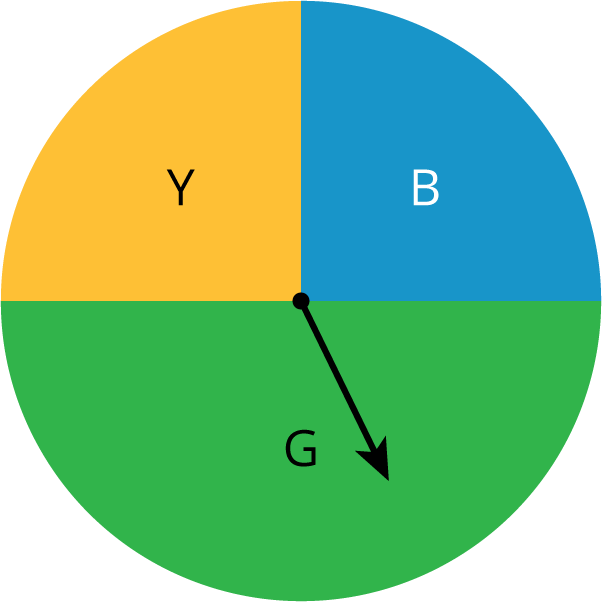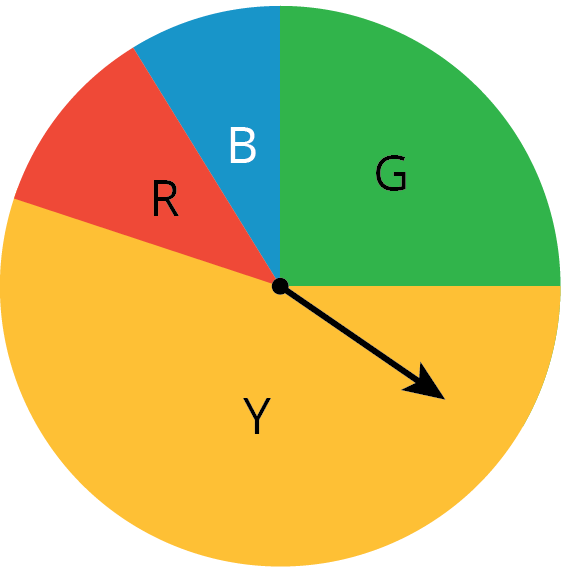Lesson 2
Chance Experiments
Let’s investigate chance.
2.1: Which is More Likely?
Which is more likely to happen?
-
When reaching into a dark closet and pulling out one shoe from a pile of 20 pairs of shoes, you pull out a left shoe.
-
When listening to a playlist—which has 5 songs on it—in shuffle mode, the first song on the playlist plays first.
2.2: How Likely Is It?
-
Label each event with one of these options:
impossible, unlikely, equally likely as not, likely, certain
- You will win grand prize in a raffle if you purchased 2 out of the 100 tickets.
- You will wait less than 10 minutes before ordering at a fast food restaurant.
- You will get an even number when you roll a standard number cube.
- A four-year-old child is over 6 feet tall.
- No one in your class will be late to class next week.
- The next baby born at a hospital will be a boy.
g. It will snow at our school on July 1.
h. The Sun will set today before 11:00 p.m.
i. Spinning this spinner will result in green.
j. Spinning this spinner will result in red.

- Discuss your answers to the previous question with your partner. If you disagree, work to reach an agreement.
-
Invent another situation for each label, for a total of 5 more events.
2.3: Take a Chance
This applet displays a random number from 1 to 6, like a number cube. With a partner, you will play a game of chance.
-
In the first round, one of you will score on an even roll and one of you will score on an odd roll. You decide that first.
-
In the second round, the winner of round 1 will score on numbers \(1 - 4\), and the other player will score on numbers \(5 - 6\).
-
Each round is 10 rolls. Be sure to turn on "History" after your first roll and wait for it to update before rolling again.
- When each player had three numbers, did one of them usually win?
- When one player had four numbers, did you expect them to win? Explain your reasoning.
On a game show, there are 3 closed doors. One door has a prize behind it. The contestant chooses one of the doors. The host of the game show, who knows where the prize is located, opens one of the other doors which does not have the prize. The contestant can choose to stay with their first choice or switch to the remaining closed door.
- Do you think it matters if the contestant switches doors or stays?
-
Practice playing the game with your partner and record your results. Whoever is the host starts each round by secretly deciding which door has the prize.
- Play 20 rounds where the contestant always stays with their first choice.
- Play 20 more rounds where the contestant always switches doors.
- Did the results from playing the game change your answer to the first question? Explain.
2.4: Card Sort: Likelihood
-
Your teacher will give you some cards that describe events. Order the events from least likely to most likely.
-
After ordering the first set of cards, pause here so your teacher can review your work. Then, your teacher will give you a second set of cards.
-
Add the new set of cards to the first set so that all of the cards are ordered from least likely to most likely.
Summary
A chance experiment is something that happens where the outcome is unknown. For example, if we flip a coin, we don’t know if the result will be a head or a tail. An outcome of a chance experiment is something that can happen when you do a chance experiment. For example, when you flip a coin, one possible outcome is that you will get a head. An event is a set of one or more outcomes.
We can describe events using these phrases:
- Impossible
- Unlikely
- Equally likely as not
- Likely
- Certain
For example, if you flip a coin:
- It is impossible that the coin will turn into a bottle of ketchup.
- It is unlikely the coin will land on its edge.
- It is equally likely as not that you will get a tail.
- It is likely that you will get a head or a tail.
- It is certain that the coin will land somewhere.
The probability of an event is a measure of the likelihood that an event will occur. We will learn more about probabilities in the lessons to come.
Glossary Entries
- chance experiment
A chance experiment is something you can do over and over again, and you don’t know what will happen each time.
For example, each time you spin the spinner, it could land on red, yellow, blue, or green.

- event
An event is a set of one or more outcomes in a chance experiment. For example, if we roll a number cube, there are six possible outcomes.

Examples of events are “rolling a number less than 3,” “rolling an even number,” or “rolling a 5.”
- outcome
An outcome of a chance experiment is one of the things that can happen when you do the experiment. For example, the possible outcomes of tossing a coin are heads and tails.